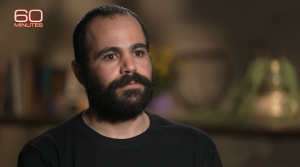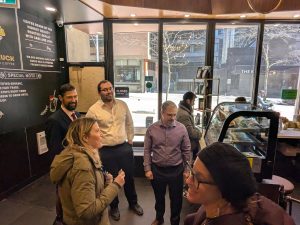Eyewitnesses to the point-blank shooting of two Jerusalem police officers March 8 on a main east Jerusalem street described a remarkable scene. One shopkeeper said it was “like the Wild West, but right outside my door.”
Mid-morning on the day following the attacks, Salah Ad-Din Street, which would normally be thrumming with street traffic, was all but deserted with at least half of its shops shuttered.
Merchants were cautious and fearful. “Are you a police investigator?” one asked The Media Line.
Ibrahim Moaket, who with his brother Faez runs a spice shop on the very corner where the police officers were felled, described how “everyone heard the shots. First thing we did was close the [metallic] shutters.”
READ: PRO-PALESTINIAN ACTIVISTS HONOUR TERRORIST AT AMSTERDAM UNIVERSITY CAFE
Their shop had been full of clients that Tuesday afternoon. “This thing that happened, the shooting,” Ibrahim said, “its not good. It’s terrible. For all of us.”
Imad Muna, one of two brothers who own the Educational Bookshop, a popular café/bookstore, described handing a customer a book “and while I was giving it to him, I heard the first shot.” He said that most of his customers ran upstairs to the cafeteria while he ran to the window to see what was going on.
He saw a man standing with his legs planted wide apart, both hands firmly holding a gun, shooting at a pair of police officers across the narrow street.
“I saw him running down the road and a shootout started. For 10 or 15 minutes there was shooting and police cars, motorbikes and horses flooded the street.
“I heard at least a hundred live bullets. I saw the injured cop lying on the ground at the corner.”
The dramatic events witnessed by Muna in the late afternoon came at the same time U.S. Vice-President Joe Biden was landing in Israel.
The rapid sequence of attacks comes at a time when the uprising of Palestinian “lone wolf” attackers enters its sixth month, with no signs of a cessation.
In one of Tuesday night’s attacks, a U.S. citizen, 29-year-old Vanderbilt graduate student Taylor Force, was stabbed to death in Tel Aviv.
By midday the next day, only hours before Biden was scheduled to meet with Palestinian President Mahmoud Abbas, the Palestinian Authority had issued no condemnation of the attacks.
Israeli leaders across the board assailed the violence and the lack of Palestinian reaction.
Speaking to journalists as he exited the meeting with Biden, Israeli Prime Minister Benjamin Netanyahu said “unfortunately it’s not just that President Abbas refused to condemn these terror attacks, his Fatah party actually praised the murderer of an American citizen as a Palestinian martyr and a hero.”
Netanyahu was referring to Palestine TV broadcasts that referred to Bashar Masalha, the 22-year-old stabber, as a “martyr.” One report described the attack in which Force died as “a complex operation …carried out by a martyr.”
Biden, at the same press briefing, started out by saying that “the United States condemns these acts and condemns the failure to condemn them. This cannot become an accepted modus operandi.
“This cannot be viewed by civilized people as an appropriate way to behave. This is not tolerable in the 21st century. The U.S. stands firmly by Israel’s right to defend itself.”
Almost concurrent with the Biden-Netanyahu meeting, a double shooting attack took place in Jerusalem, with two terrorists initially taking aim at a bus full of passengers. For reasons that remain unclear, the pair desisted, fled in a car and continued shooting several kilometres away, near Jerusalem’s Old City.
READ: ISRAEL NOT COMPROMISING DEMOCRACY IN TERROR FIGHT: TOP JURIST
An Arab Israeli man was severely wounded when he was shot in the head. Both shooters were later killed by police.
On Salah Ad-Din Street, Asil, a young girl in a headscarf, walked into a chocolate shop and admitted that she was “a little afraid to be out on the street.” Most residents were less courageous and stayed at home.
Shopkeepers described the scene the night before, as police forced them to lock up, keeping them on site for two hours as they went door-by-door checking the cellphones and ID cards of sellers and customers in the vicinity.
Tamer Izhiman, who together with his brothers and his father, Adli, operates the coffee and chocolate shop that bears the family name, foresees a loss of “90 per cent of our business for the next week, and 50 per cent for the next month.”
Speaking with The Media Line Izhiman described an active and enthusiastic social media scene that Tuesday night, with young Palestinians gleefully claiming to know the shooter of the two policemen, both of whom remain hospitalized in serious condition. “Everyone gets on Facebook saying ‘he’s from my neighbourhood!’ or ‘no, he’s from my neighbourhood!’ because the guy shot at cops and didn’t kill innocent people on the street.”
Not all Palestinians feel this way, he added. “Some people care more about their business. About their families.”






